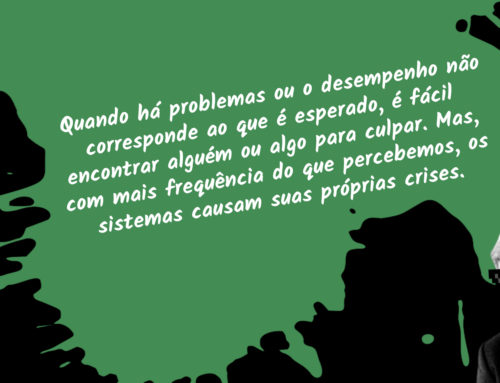I was wrong. Every time I was asked what level of maturity is needed to work in a self-managed company I would say:
– Self-management demands and promotes maturity. So if you want to help people mature, self-management is the best way. Anyone who is responsible for their actions can work in a self-managed company.
Today I realize that my answer was off somewhat. Today I think the most correct is:
– In self-management it is easier to be mature. At least in the kind of self-management I believe in and encourage. So, as self-management demands maturity, it also makes people’s lives easier for them to behave in a mature way.
Astonished? Let’s try something. Think of examples of behaviors that you might consider a mature person within an organization to do. Make a list of these behaviors. Here’s mine:
- A mature person waits for his turn to speak in meetings.
- A mature person empathizes with a colleague when he or she is having difficulty doing something.
- A mature person seeks and knows how to receive feedback.
- A mature person admits to errors he or she made on a project.
- A mature person has self-responsibility and does not outsource decisions.
- A mature person deals with discomfort and does not gossip.
Now, let’s look at each of the items and estimate how difficult it is to act this way in a traditional, hierarchical organization compared to a self-managed organization.
Respect your time to speak at meetings
In a hierarchical organization your superior may not give you space to speak. But let’s assume that space exists. Even so, it is rare to find a facilitator present at the meeting who has the authority to distribute speaking times amongst everyone. As such, it is common for some to dominate the conversation in their quest to show their work and ideas to the manager.
In a self-managed organization, even more so with O2 social technology supporting practices, there is a facilitator to remind me that this is not my time to talk. And this facilitator is chosen by the group on a regular basis and follows a clear process applied to everyone, generating legitimacy.
Today I feel unengaged in meetings with 5 or more people and no facilitator.
Have empathy for your colleagues
When we are managers, we are pressed for results by our subordinates. This pressure, added to the fact that we are increasingly distant from the activities of our subordinates’ subordinates, changes our perspective on others. We’ve lost some of our ability to empathize. This phenomenon that we experience in real life has already been studied in the laboratory with visible impacts on brain function.
In a self-managed organization we try to minimize the power we have over each other and maximize the power we have in working with each other. This is done by building and reviewing explicit agreements. It’s still not something people learn in school, but the art of making deals allows for the creation of an environment that facilitates the exercise of empathy within organizations of all types and sizes.
Seek and know how to receive feedback
I hear a lot of complaints about feedback from traditional companies. A common pain is that people receive little and want more, another is that feedback is used as a weapon to humiliate and punish a subordinate and finally that so-and-so doesn’t know how to receive feedback. If we investigate deeply we find some common phenomena.
There is a boss and a team following a ratio between 1:5 to 1:20. We have one person who needs to give feedback to many. This person is rarely able to pay attention to everything that happens to his subordinates. Subordinates only consider feedback valid when it comes from the boss. And the boss is pressured to find faults in the subordinate’s work and point them out with constructive feedback. Mix these elements together and imagine that the result could only be what we have. Managers who point out flaws without knowing the context, feedback once a semester and everyone complaining.
In self-management, problems start to get easier when the sources of feedback and recognition that are considered valid become abundant, as there is not just one person who decides about their future in the organization. I can seek feedback from someone in the organization who seems to have more experience with a particular subject or skill I’m working on rather than the boss.
I get less emotionally charged feedback because I know the person isn’t trying to fit me into what they consider to be the ideal employee shape. Much easier.
Assume a mistake you made
In her book Mistakes Were Made (but not by me) – Carol Travis describes a phenomenon that lies at the heart of self-righteousness.:
“The engine that drives self-justification, the energy that produces the need to justify our actions and decisions – especially the wrong ones – is an unpleasant sensation that Leon Festinger called “cognitive dissonance”. Cognitive dissonance is a state of tension that occurs whenever a person has two cognitions (ideas, attitudes, beliefs, opinions) that are psychologically inconsistent, such as “Smoking is a stupid thing because it can kill me” and “I smoke two packs a day .” Dissonance produces mental discomfort, ranging from minor pain to deep anguish; people don’t rest until they find a way to reduce it.”
When we are in a traditional company, moving up the career ladder is hard we often find a culture that believes in meritocracy. Our success depends on maintaining an external image of competence which includes using self-deception to achieve this goal.
Adding this to a tendency that most people have a dualistic view of the world (there is only right or wrong, black or white) and we have the recipe for everyone to get theirs out of line. After all, I can’t be competent at the same time that I make a blunder in the process of purchasing a consulting service.
In self-management, the competition for the few places at the top of the pyramid begins to be dismantled. There is room for completeness and vulnerability is encouraged. I don’t need to take on the hero role. I feel much easier accepting mistakes, not because I’m more humble or mature than I was before, but because I know I have space for that.
Be self-responsible and do not third-party decisions
In a company with bosses, it is very common to have pre-existing structures, policies and practices that take responsibility away from people. There are situations where they decide but let others handle the consequences, like when directors decide to fire 20% of people and command HR to deal with the clean-up. At other times, employees do not decide because they know their decisions can be reversed at higher levels, so they level up the most banal decisions. Finally, managers who have already made decisions call a team meeting to create a scene and record that it was a “consensual” decision and thus avoid punishment if the decision proves disastrous.
In a self-managed company one is very clear about the authority and responsibility of everyone in the organization. We have strengthened in various rituals a belief that people feeling the tension are the best person to deal with their own tensions. When the facilitator asks at the meeting:
– What is your tension and what do you need?
I need to get involved in the process and not just point out problems, let alone wait for the group or someone else to take care of my life. And that goes for everyone, which makes it so much easier.
Don’t gossip
Go have a coffee at a traditional company and see the small groups in the staff room chatting. I bet you will find a person complaining about someone, a boss or an employee. It’s so common that it seems to be a behavior that originated with our ancestors in the African savannah.
The less space we have or the less we know ways to deal with our problems, the more we will need to vent. For me gossip is a kind of outburst from someone who couldn’t find a better way to solve their problems.
Working in a self-managed company, I feel more and more able to resolve my tensions in a healthier way. For example, having difficult conversations or making explicit agreements. As a result, I feel the need to gossip less and less. And I see the same in colleagues. We are not hyper conscious and deconstructed humans. On the contrary. What happens is that our energy is channeled into something more effective than a complaint or outburst at the coffee table.
If it’s so easy, why isn’t it more common?
We are all looking for good strategies to meet our universal human needs. We need attention, recognition, autonomy, meaning, etc. We are also hypersocial beings. Many of these needs are only met when we are part of a social group. Organizations should help us meet our needs or at least not get in the way.
The word immaturity is used as a label we give to people who are like us, seeking to meet the same needs, but in a somewhat (or a lot) messy and disastrous way. What we need is to make their lives easier. Help them make use of strategies that increase the chance that others around them will also meet their needs.
We all gain from social systems that promote mutual learning and development. For me, self-management is a way to do that. It’s just not common anymore, as the society we live in is still stuck in a “great place”.
Great place is a term within an approach that was born in biology, called Fitness Landscape, which I want to apply to a process of cultural evolution of organizations. In Adaptive Landscape we create a graph (often 3D) that shows how each organizational culture (1 point on the graph) resembles another by distance (X and Y axes) and how well each culture is adapted to the context of society (height or Z axis).

Today most organizations are locked into an optimal location (minor peak) in a fitness landscape that is dynamic. The highest peak where few self-managed organizations live did not always exist. It begins to emerge with changes in the broader culture of society.
Target Teal’s challenge and purpose is to help companies in this evolutionary process. This is certainly not easy, but when I am asked from now on about the maturity level that is required to work at a self-managed company like Target Teal, my answer will be:
– It’s never been easier to be a mature person.
Translated by Tanya Stergiou






Leave A Comment